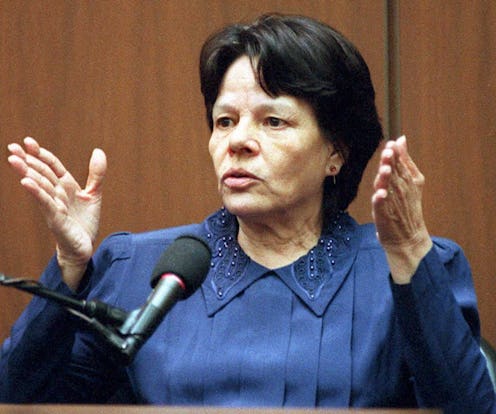O.J. Simpson's infamous white Bronco contributed more than just the car chase that glued the entire country to their TV screens in the '90s. The Bronco also figured prominently into the defense's case in the form of testimony from Simpson's neighbor's housekeeper Rosa Lopez. The Los Angeles Times reported that Lopez was the sole witness who could allegedly place Simpson at home during the time of the murders of Nicole Brown Simpson and Ronald Goldman. (Although O.J. was later acquitted of the murders in 1995, according to The New York Times, he was found responsible in the resulting 1997 civil suit and ordered to pay "$25 million in punitive damages to the families.") Lopez was called by the defense to testify that she'd allegedly seen Simpson's now iconic vehicle parked in his driveway and that it had allegedly remained there all night.
The controversy around Lopez's testimony was par for the course for the long and messy proceedings, now being reintroduced by the FX Series American Crime Story. According to The LA Times, Judge Lance Ito fined defense attorneys Johnnie Cochran and Carl E. Douglas $950 each for neglecting to relay an audiotape to the prosecution of an interview Lopez did with the defense the summer before the trial. In addition to fining the defense, The LA Times reported that Ito said that should Lopez's testimony be used, Ito would have to issue the following caveat to the jury: "You may consider the effect of this delay in disclosure, if any, upon the credibility of the witness involved and give to it the weight to which you feel it is entitled."
According to another New York Times article, Cochran claimed he didn't know about the audiotape in advance. "I'll live with what the judge does," he said, according to the NYT. "We'll pay that and move on. We're big boys, big men, and we'll move right on. He didn't find it to be a lie, and he knows I wouldn't lie to him."
The LA Times reported that Lopez spent three days on the stand being cross-examined by the prosecution; the witness communicated through an interpreter. Lopez's original testimony was videotaped while the jury was not in the room; according to the Chicago Tribune, Lopez was considering returning to her home country of El Salvador before the defense would be presenting their case, so the testimony was recorded for possible future use, allowing Lopez to leave the country afterwards.
Lopez's testimony was complicated. "Many questions she brushed aside with a simple, 'If you say so,'" The New York Times said of her responses. Prosecutor Christopher Darden performed the cross-examination for the state. According to the NYT, after a particularly confusing round of verifying the dates and times she'd met with Cochran, Darden prompted Lopez saying, "You're not very time conscious, correct?" The witness replied, "Yes. I'm conscious about the time that I waste here."
After her testimony concluded, Lopez's lawyers told the press that she'd be moving to El Salvador as soon as possible, according to The Los Angeles Times, who also reported that Lopez had received tokens of support and even cash during the trial from her admirers. The LA Times wrote that she planned to use the cash to fund her travel.
According to the Chicago Tribune, Lopez had been a field worker in her home country before coming to the United States in 1969. She became a citizen two decades later. Six years after that, she was a star witness in the most high-profile murder trials in recent history. "It's not my fault that I worked next to Mr. Simpson. It's not my fault what I saw and heard," Lopez said to Judge Ito when a delay extended her obligation as a witness, according to the Tribune. "I'm very sick, sir. I can't eat during the day, sir. I'm not sleeping very well."
According to Vanity Fair, Lopez returned to El Salvador and dropped off the grid once her role in the trial was complete.
